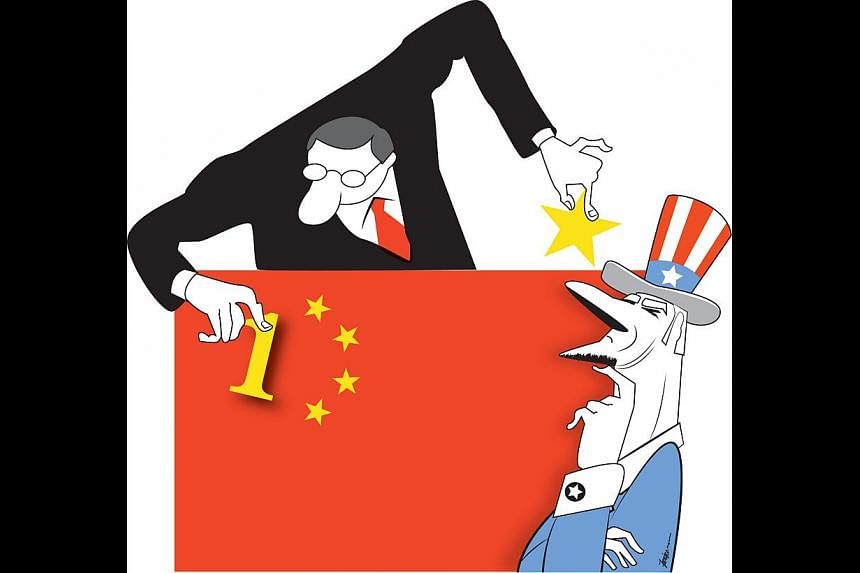Third, the role that China will play as the No. 1 economic power has not been cast in stone.
How the world, especially America, reacts to China's rise will help to influence China's behaviour in the future.
If we make the right decisions now, China could well emerge as a benign great power (even though most Americans find this virtually inconceivable).
At the same time, many Americans are not aware that some recent American actions have set bad precedents for China to follow when it becomes No. 1.
The first such American action was to launch quantitative easing (QE).
Until the onset of the crisis, Chinese leaders were happy that the United States and China had settled into a comfortable pattern of mutual dependence. China relied on the US markets to generate exports and jobs. The US relied on China to buy US Treasury bills to fund US deficit spending.
This Chinese confidence of mutual interdependence was shattered when the US Fed announced the first round of QE measures in November 2008. The Fed's actions demonstrated that the US did not have to rely on China to buy US Treasury bills.
The second American action was to engage in extraterrestrial application of domestic laws. It did this when it prosecuted several banks, including HSBC, RBS, UBS, Credit Suisse and Standard Chartered.
In 2012, the US fined Standard Chartered US$340 million (about S$450 million) for making payments to Iran. Most Americans reacted with equanimity to the bank being fined for dealing with the "evil" Iranian regime.
But Standard Chartered, domiciled in the United Kingdom, had broken no British laws. Nor had it violated any mandatory sanctions imposed by the United Nations Security Council.
However, since almost all international payments have to go through the US payment mechanism, Standard Chartered was fined for violating American laws. In short, the US was applying American laws to non-American citizens and non-American corporations operating outside America.
The third American action was to threaten countries by denying them access to the Swift system. Since all international payments have to go through the Swift system, any country denied access to the Swift is thrown into a black hole and denied access to any kind of international trading and investment.
In a recent column, Fareed Zakaria described well the Russian reaction to the possibility of being denied access to the Swift system. In Western media commentaries, President Vladimir Putin is often portrayed as the bad guy and Prime Minister Dmitry Medvedev is portrayed as the good guy. Yet, it was the "good guy" who said: "Russian response - economically and otherwise - will know no limits."
China's dream of renewal
I TELL these three stories upfront because as Americans ponder how China should behave as a No. 1 power, they should also reflect on the question of whether America has served as a good role model of a No. 1 power. This is the big question I raise in my conclusion.
To get to the conclusion, let me address the first key question: What are the goals and ambitions of China's leaders as China emerges as No. 1?
Unlike the leaders of the erstwhile USSR, the Chinese leaders have no desire to prove the superiority of the Soviet communist system. So if it is not communism that they are trying to promote, what is it? And the simple answer is that they would just like to revive Chinese civilisation.
If there is one thing that motivates China's leaders, it is their memory of the many humiliations that China has suffered over the past 150 years. If there is a credo that drives them, it is a simple one: "No more humiliation". This is why they want to make China a great and powerful nation again.
President Xi Jinping explained this goal well in his address to Unesco on March 27 last year. He said: "The Chinese people are striving to fulfil the Chinese dream of the great renewal of the Chinese nation.
"The Chinese dream is about prosperity of the country, rejuvenation of the nation, and happiness of the people. It reflects both the ideal of the Chinese people today and our time-honoured tradition to seek constant progress.
"The Chinese dream will be realised through balanced development and mutual reinforcement of material and cultural progress.
"Without the continuation and development of civilisation or the promotion and prosperity of culture, the Chinese dream will not come true."
However, many in the West will not rest easy till China transforms itself into a liberal democracy.
They assume that if China's system is changed and a Western-style democracy emerges in China, this will be an unmitigated good. This is a dangerous assumption to make.
A more democratic China is likely to be a more nationalist China. A more nationalist China could well be a more assertive and aggressive China. In this sense, the Chinese Communist Party is delivering a major global public good by restraining nationalist forces and voices in China.
Present calm is a miracle
SO FAR, as we know well, China has emerged peacefully. This is a result of wise Chinese leadership. However, it is also a result of wise American policies towards China.
This explains the unusual calm we see in Sino-American relations. Normally, when the world's largest emerging power is about to pass the world's greatest power, we should be seeing a rising level of tensions between the two. It would therefore be perfectly normal to see rising tensions between the US and China today.
Instead, we see the exact opposite: perfectly normal and calm relations.
The US began engaging China seriously during the Cold War when China became a valuable ally against the Soviet Union.
However, it continued even after the Cold War ended. Despite tensions in the 1990s due to the Tiananmen Square episode, both sides made efforts to keep the relationship on an even keel.
When President Bill Clinton took office in January 1993, after having described the leaders of China as the "butchers of Beijing", one could easily have predicted a far bumpier road. Fortunately, Mr Clinton reacted wisely.
I was present at the first Asia-Pacific Economic Cooperation leaders' meeting on Blake Island in November 1993 and saw with my own eyes how Mr Clinton and President Jiang Zemin made an enormous effort to reach out to each other. By the end of the day, their mutual wariness was replaced by a significant degree of personal bonhomie.
The US helped China to gain membership to the World Trade Organisation.
And the US has also helped China by being sensitive to the issues in Taiwan - indeed, coming down very hard on the leaders of Taiwan when they tried to push for independence.
The US has also been extraordinarily generous to open the doors of its prestigious educational institutions to students from China.
In the 2013-2014 academic year, 275,000 Chinese students were enrolled at American universities. Future historians will be puzzled by this massive act of generosity as many of these students then return to China to propel China forward in areas ranging from space exploration to defence.
All these wise American actions have resulted in a miracle: a calm US-China relationship.
However, miracles are by definition historical aberrations. They don't last.
Soon, we will revert to the historical norm and see rising competition between the world's two greatest powers. An early example of the new form of competition was provided by the recent American efforts to persuade countries from joining China's initiative in the setting up of the Asian Infrastructure Investment Bank. Even the United Kingdom was accused of "constant accommodation of China, which is not the best way to engage a rising power".
To avoid rising competition, both sides need to learn from the mistakes they have made. China needs to learn lessons from its assertiveness vis-a-vis Japan and its Asean neighbours. America needs to ask whether its recent actions have served as a good role model for China.
This is why I began with the three stories on QE, extra-territorial application of domestic laws and denying access to Swift.
They illustrate why America should study its own recent deeds through a simple lens: Would it like China to replicate these deeds when China becomes No. 1? The reason for using this lens is that when China clearly becomes No. 1, it is likely to replicate America's deeds, not its words.
America was able to and could threaten to act unilaterally in the three cases I cited because it is clear that America is still the reigning Emperor of the global financial system.
It unilaterally controls the global reserve currency, the US dollar. In theory, the US dollar is a global public good but, in practice, it is an instrument of American domestic and foreign policies.
There is therefore the big danger of the US using global public goods, like the US dollar, international banking transactions, and the Swift system, for unilateral purposes and ends.
It will encourage the world, especially China, to work towards creating an alternative global order. If that happens, the world will become a far messier place.
One reason why the world has been remarkably stable and peaceful over the past few decades is that the rest of the world, especially Asians, had agreed to accept and work with the Western-created family of global institutions, including the UN, International Monetary Fund and the World Bank.
They agreed to do so because they believed that these institutions were serving global interests, not Western interests. However, the US has on several occasions made unwise moves to undermine these global institutions. And every action that the US makes to undermine these institutions could now be replicated by China.
If America seeks to strengthen a global order that serves global interests, China will do the same.
If this happens, nothing will change fundamentally when China becomes No. 1. We will continue to live in a safe and predictable world. In other words, China could emerge as a stakeholder that is as responsible as the US.
Since America is still the No. 1 power in the world, the big question that America should ask itself is a simple one: Would it feel comfortable living in a world where China behaves just as America did when it was the sole superpower?
The writer is dean of the Lee Kuan Yew School of Public Policy, National University of Singapore. This essay is based on the Albert H. Gordon lecture he delivered at Harvard University's Kennedy School of Government on April 8.






